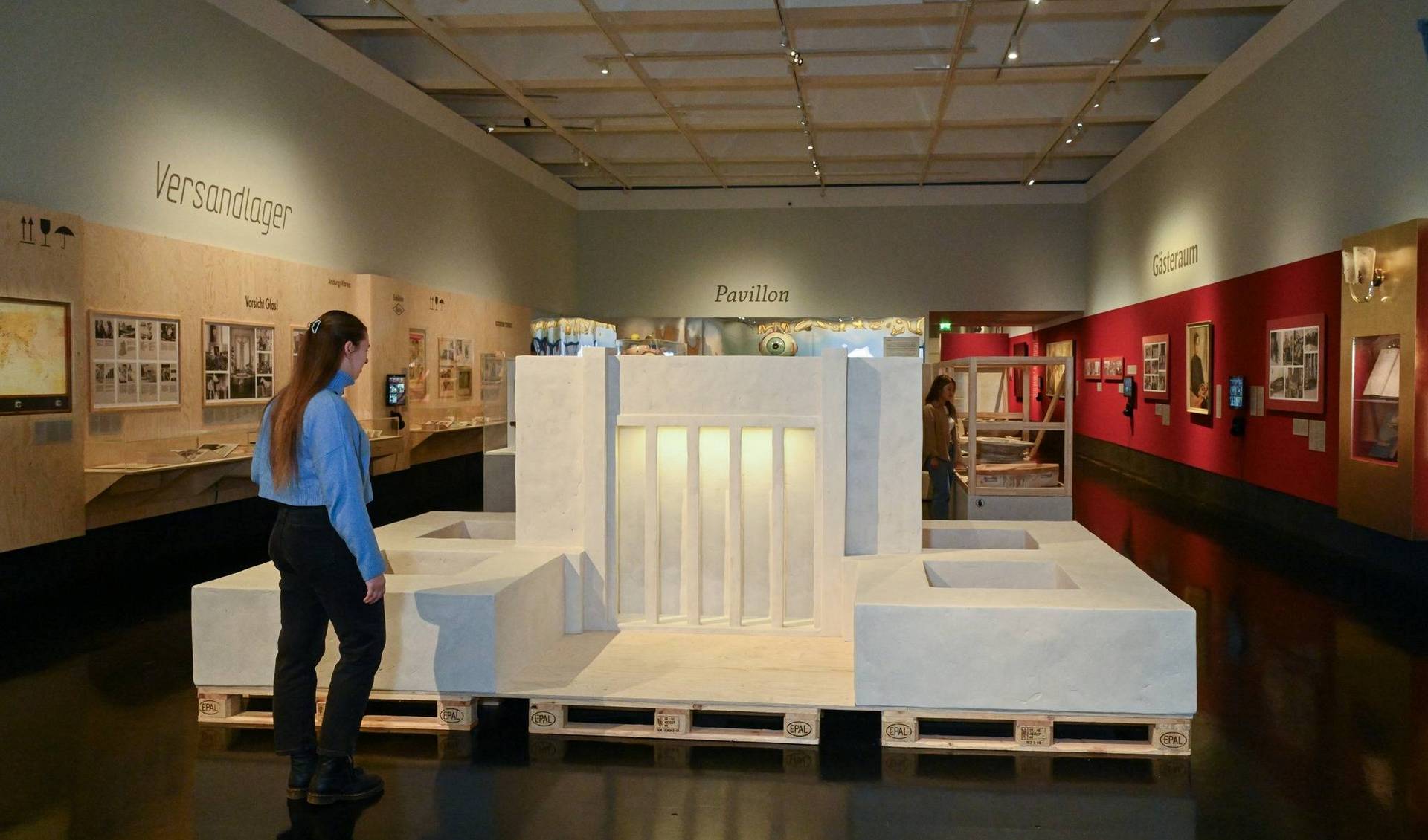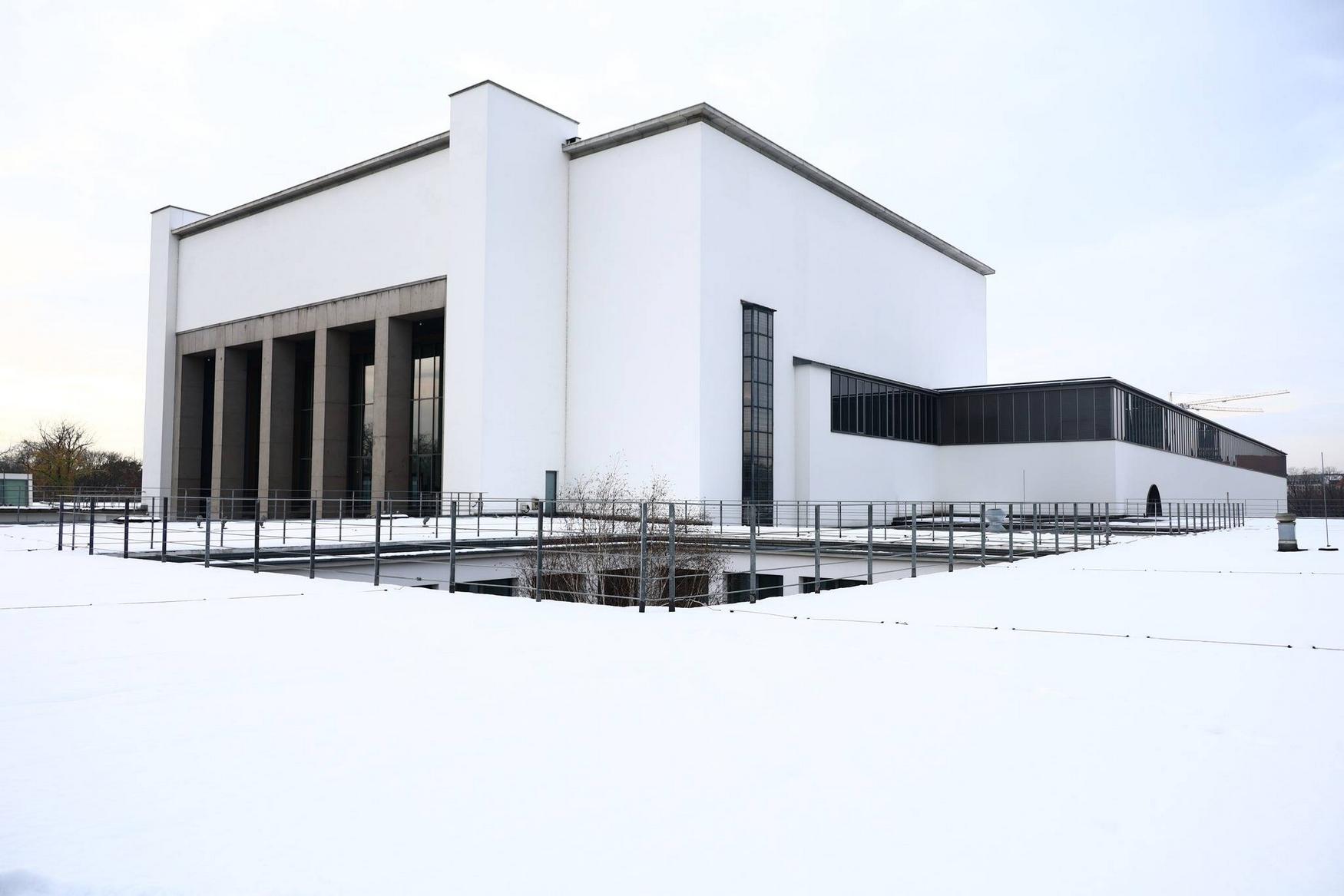In the heart of Dresden, a city rich with culture and history, a museum transcends the traditional expectations of a history showcase. The Deutsches Hygiene-Museum, a pioneer in its field since 1912, offers an engaging and educational journey through human biology, health, and wellness. This museum is not just a treasure trove for science enthusiasts; it is designed with families in mind, making it an excellent destination for parents keen to spark their children's curiosity about the human body and various health-related topics.
Its interactive exhibits are perfect for young visitors, making learning fun and memorable. Children can explore the mysteries of human adventure, including a close-up look at the Transparent Man, the museum's signature display. And for those looking to delve into the influence of science, culture, and society on our well-being, the museum's changing exhibitions offer fresh perspectives and discussions that resonate with a modern audience.
Contents
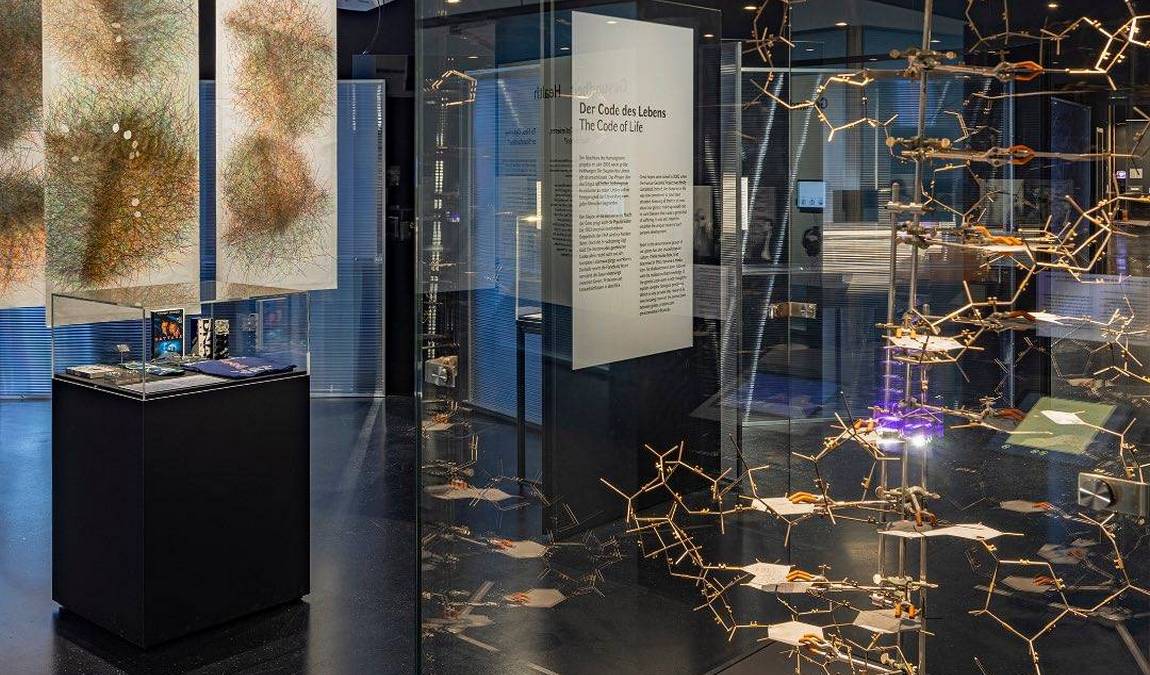 Photo: facebook.com/dhmdresden
Photo: facebook.com/dhmdresden
Planning a family trip to Dresden, including the German Hygiene-Museum on your itinerary, guarantees an enriching experience for adults and children. It's not just a museum; it's an opportunity to enter a world of discovery where every visit contributes to a deeper understanding of ourselves and our world. As one of Dresden's most frequented museums, its engaging atmosphere assures that every family member leaves with newfound knowledge and a renewed interest in the science of life.
Here is Why Your Kids Will Find it Interesting
This interactive museum is a unique cultural institution that offers an enthralling experience for children's curious minds. This museum stands out for its commitment to interactive learning, weaving together the threads of science, culture, and society in a tapestry that's as educational as it is entertaining.
- The Adventure of Human Exploration: The museum's permanent exhibition, The Human Adventure, is a treasure trove for young explorers. Featuring the iconic Transparent Man and other captivating exhibits, children can see beneath the skin and understand the human body in ways textbooks can't rival.
- A Playground of Learning: Specifically designed for younger visitors, the Children's Museum provides an immersive world of exploration. Kids encounter large-scale models of the human senses — eye, ear, tongue, nose, and skin — through interactive stations and games that make learning hands-on.
- Cultural Insights for All Ages: Deutsches Hygiene-Museum is worth visiting with kids for its scientific exhibits and cutting-edge cultural displays, stimulating thought and conversation among younger guests.
While the museum is enlightening for visitors of all ages, children aged 5 to 12 will be particularly captivated. The exhibits cater to their inquisitive nature and burgeoning interest in the world around them, promising a memorable and enriching family outing.
History of the Museum
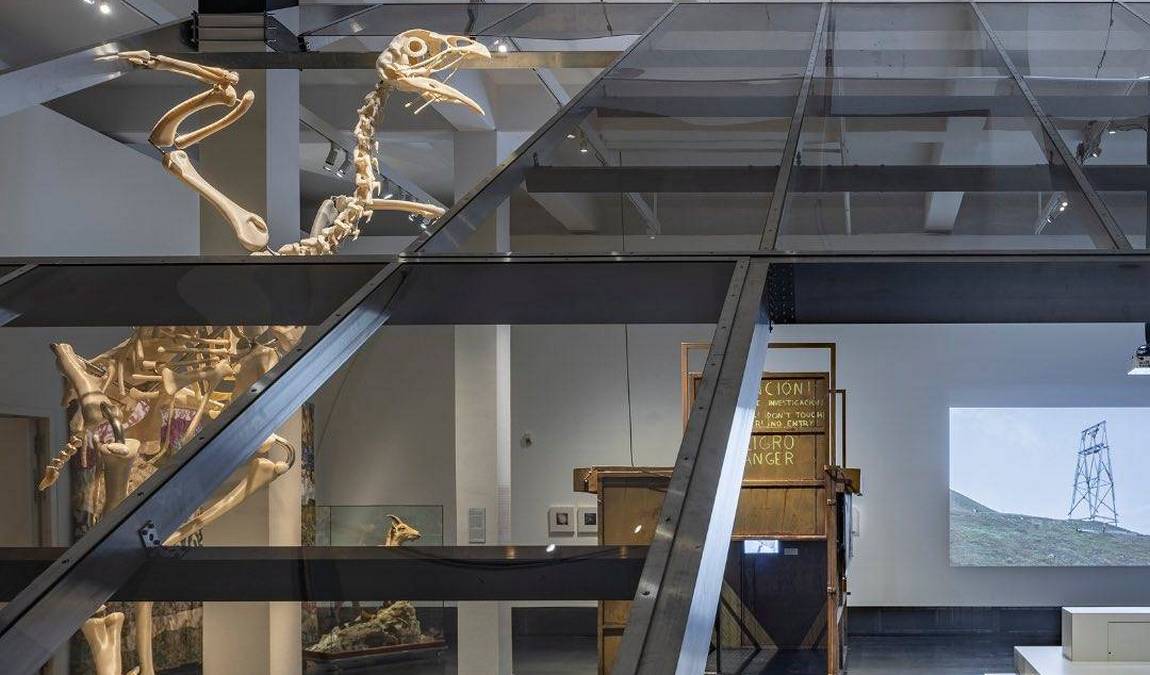 Photo: facebook.com/dhmdresden
Photo: facebook.com/dhmdresden
In 1912, Dresden industrialist Karl August Lingner laid the foundation for what is now known as the Deutsches Hygiene-Museum. Lingner, celebrated for creating the mouthwash Odol, was a key figure in organizing the First International Hygiene Exhibition in 1911, which drew over five million visitors to Dresden. The overwhelming success of this exhibition ignited the museum's inception, aiming to enlighten the masses on the importance of hygiene. Later, the Second International Hygiene Exhibition further cemented the museum's pivotal role in the field.
The museum's structure is a notable work of esteemed architect Wilhelm Kreis, distinguished by its clean lines and progressive design. It evokes the essence of hygiene and clarity of the museum champions. Visitors to the site at Lingnerplatz 1 are often struck by the building's thoughtful layout, which facilitates an educational journey for every guest, a feature especially appealing to families eager to discover the wonders of human health together.
Permanent Exhibitions
Visitors to the Deutsches Hygiene-Museum are invited to explore health and the human experience in depth. The permanent exhibitions ingeniously blend historical artifacts with interactive displays, catering to curious minds of all ages.
The Human Adventure
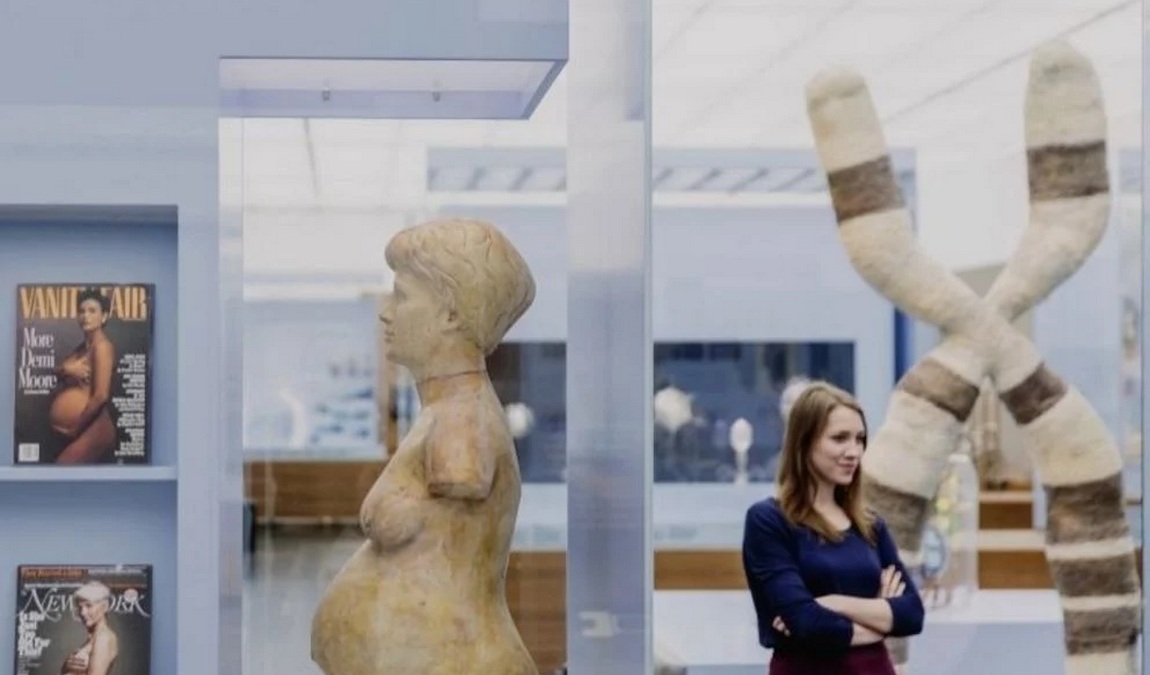 Photo: dhmd.de
Photo: dhmd.de
The centerpiece of the museum's intellectual offering, The Human Adventure, delves into the compelling narrative of human life from birth to death. Families are particularly drawn to this exhibit, as it presents an educational journey through the various stages of life, enriched by detailed models and fascinating interactive elements.
Transparent Man
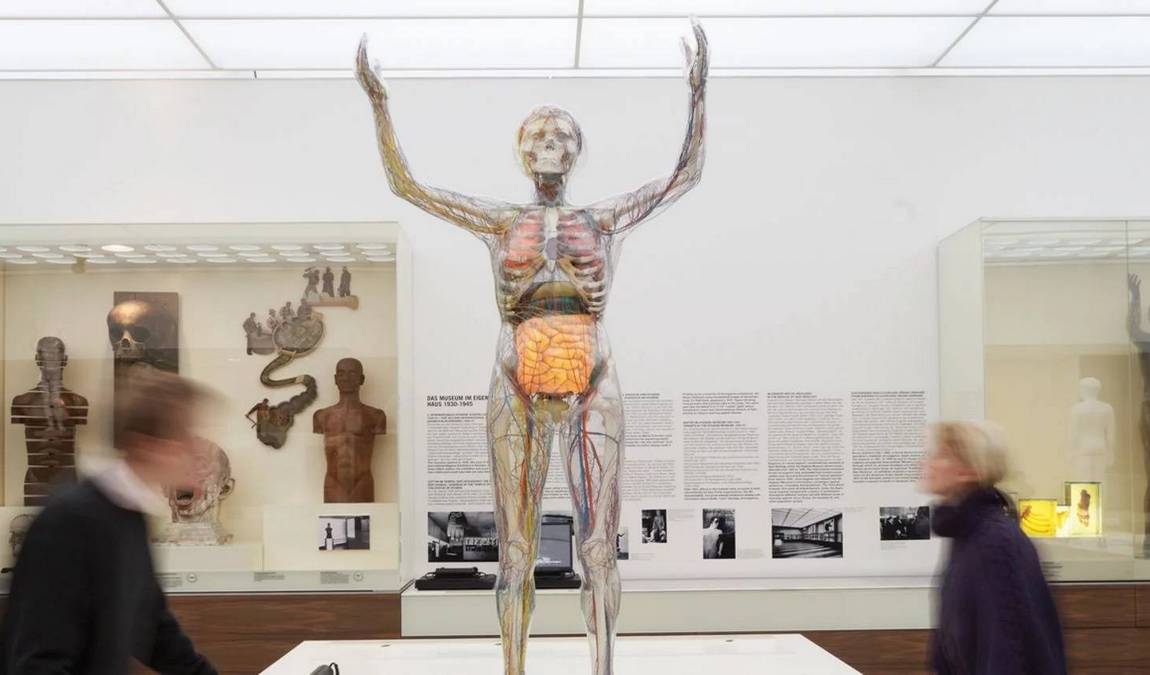 Photo: dhmd.de
Photo: dhmd.de
An iconic exhibit that never fails to captivate is the Transparent Man. This remarkable life-sized figure offers a glimpse into the human body's workings, making anatomy accessible and engaging. It is a testament to the museum's legacy in merging the boundaries between art, medicine, and education.
Five Senses
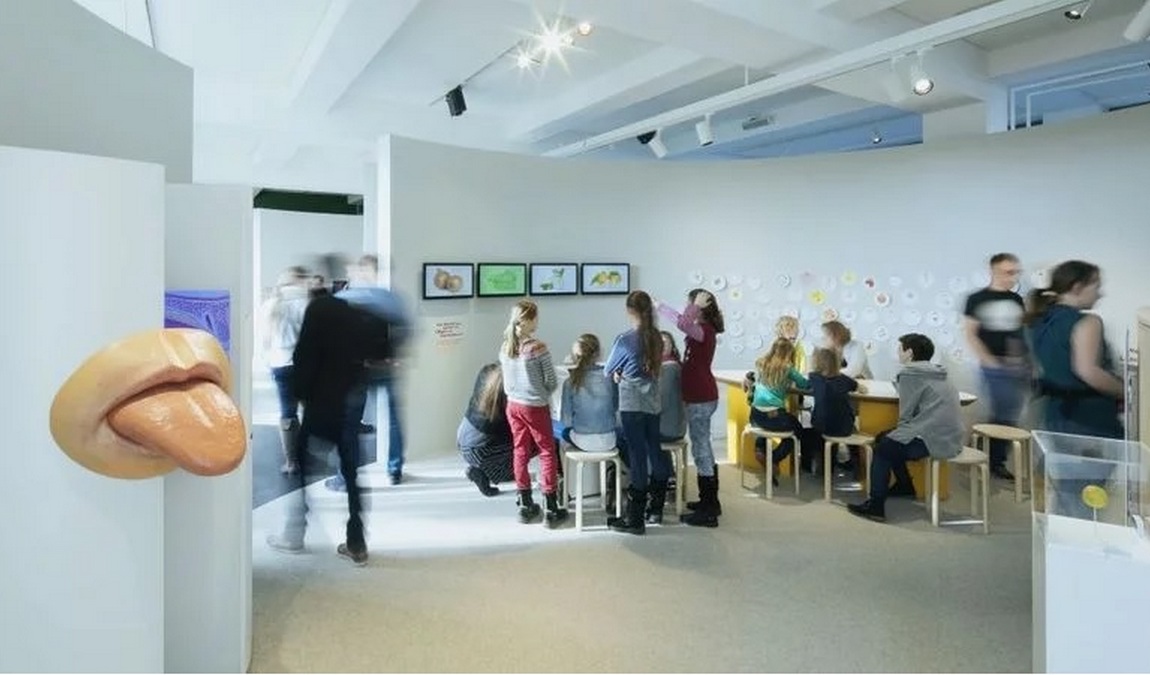 Photo: dhmd.de
Photo: dhmd.de
Geared towards younger visitors but equally enriching for adults, the Five Senses subsection illuminates how humans interact with the world. Exhibits here encourage children to touch, listen, and observe as they learn about their body's navigation tools—the senses—and their connection to mind and body.
The permanence of these exhibits ensures that every visit to the Deutsches Hygiene-Museum can be a fresh discovery of the self and what it means to be human.
Georg-Arnhold-Bad is only 400 meters away from the museum, so plan a visit there in your free time.
Temporary Exhibitions and Installations
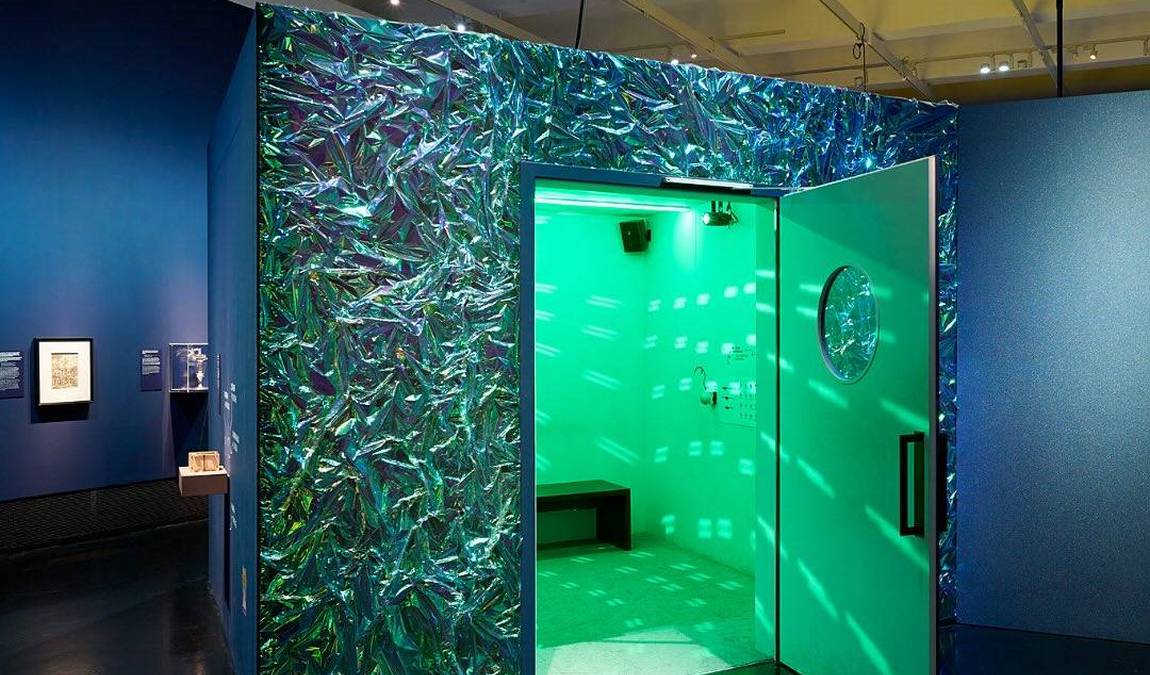 Photo: facebook.com/dhmdresden
Photo: facebook.com/dhmdresden
The Deutsches Hygiene-Museum is a trove of scientific exhibits and a hub for a vibrant and ever-changing array of temporary exhibitions. These installations are a testament to human creativity, exploring themes of health, culture, and society with a fresh perspective in each showcase.
Rotating Art Displays
The museum regularly features rotating art displays that stimulate a blend of history and contemporary discourse in Dresden. Renowned artists, such as Gerhard Richter, have displayed their works in these exhibitions, merging visual art with thematic depth. A recent highlight includes the "Lebensfreude" (Joy of Life) exhibition, a vibrant display exploring the human condition through various artistic forms.
Interactive Media Installations
Aside from static artwork, the Museum excels in offering interactive media installations that invite family participation and exploration. These engaging installations often tie back to the "Abenteuer Mensch" (Human Adventure) exhibition, which promotes understanding of the human body and mind through hands-on experiences. Children and adults alike are encouraged to discover and learn through media installations that make complex concepts accessible and entertaining.
Cultural and Scientific Impact
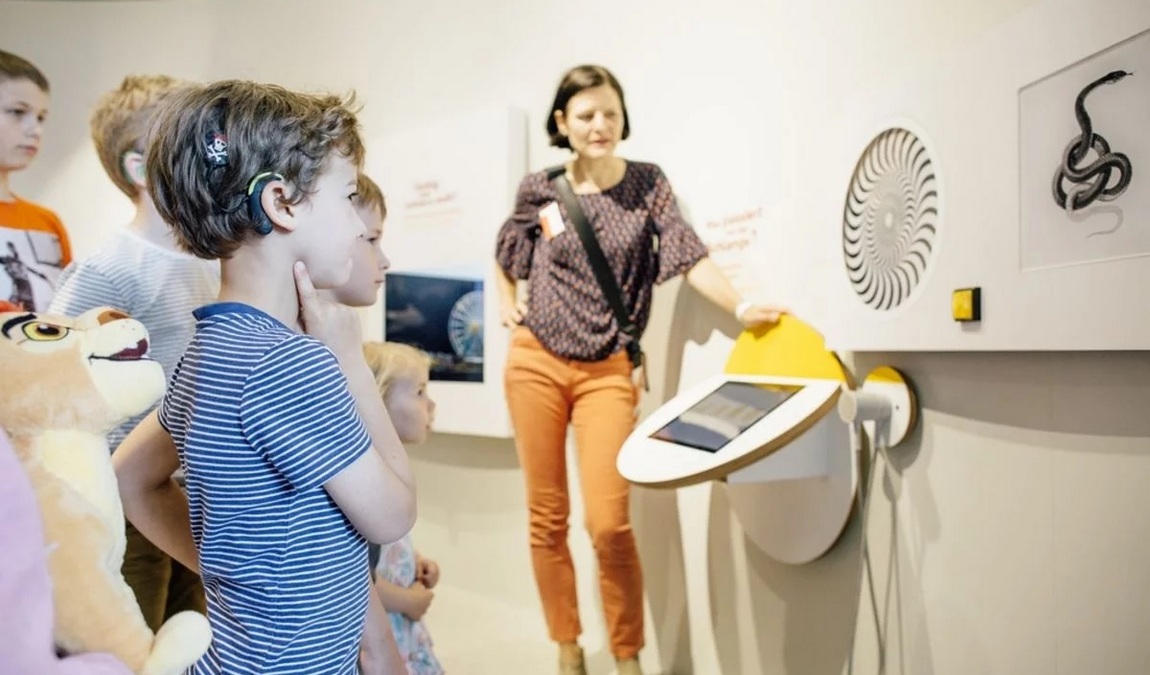 Photo: dhmd.de
Photo: dhmd.de
As a beacon of knowledge in Dresden, the Deutsches Hygiene-Museum bridges the gap between scientific understanding and societal change. It has impressed upon the collective consciousness the importance of hygiene and health, affecting both a cultural shift and a commitment to science-based education.
Hygiene and Health Education
At the heart of the Deutsches Hygiene-Museum, its mission to educate the public on hygiene and healthy living is evident. The museum offers interactive exhibits focusing on the human body and its care, extending the narrative into the broader societal impacts of individual health habits. Exhibitions often tackle how hygiene has evolved through scientific advances and cultural changes.
This unique museum does not shy away from discussions around sexuality and its place in society, providing educational resources that address the topic with sensitivity and accuracy. This bold approach, aligned with the Museum's founding ethos, creates a safe space for families to learn about aspects of life that shape their well-being.
Continually adapting, this museum has become synonymous with ongoing learning and adaptation within the realms of culture and science. It mirrors the dynamic nature of both fields in a way that captivates and educates its visitors, especially the younger ones.
Specialized Areas
Children's Museum
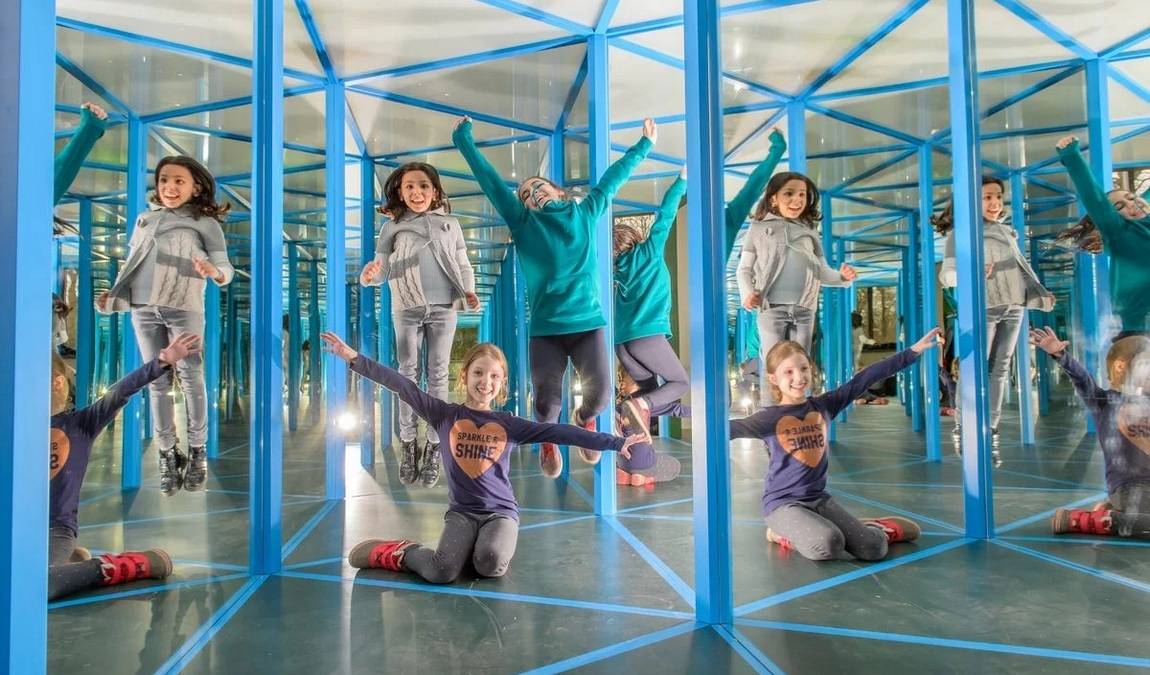 Photo: dhmd.de
Photo: dhmd.de
For the young and the curious, the Kinder-Museum, a part of the Deutsches Hygiene-Museum, provides an engaging environment specifically designed for children. Here, the complex themes of hygiene and health are broken down into accessible and interactive components, encouraging young minds to explore and learn through play. Exhibits are crafted to cater to children's innate curiosity and their developing understanding of personal and public health.
International Exhibits
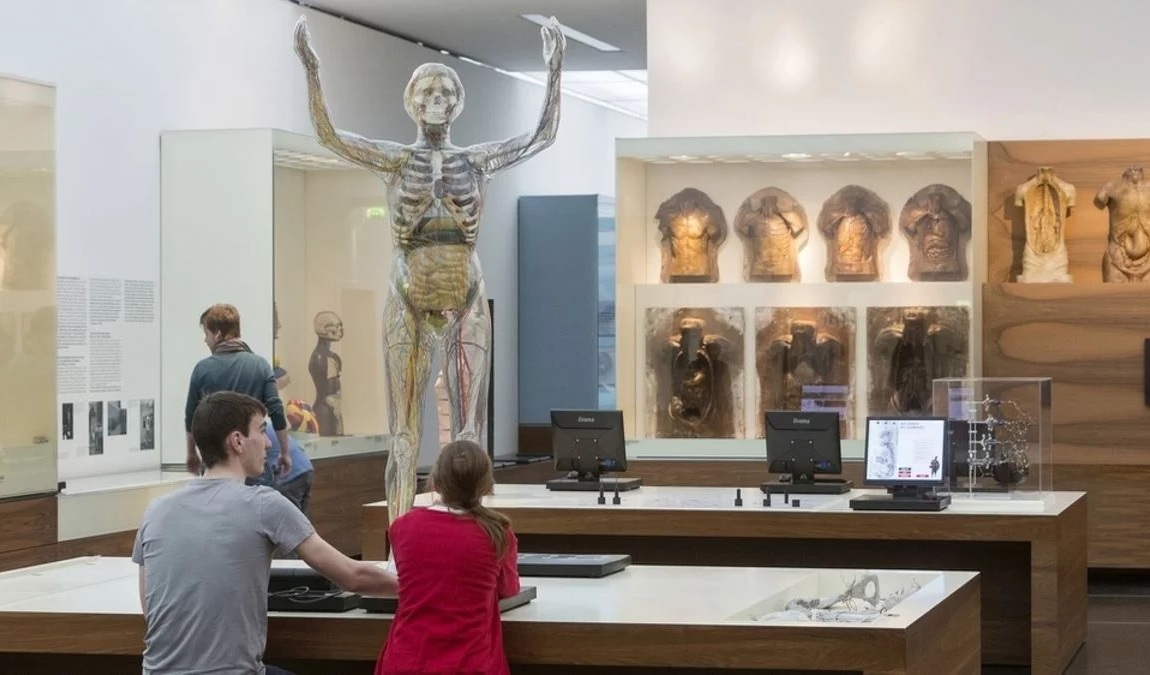 Photo: dhmd.de
Photo: dhmd.de
With a legacy rooted in the International Hygiene Exhibition of 1911 and the visionary work of Odol-mouthwash magnate Karl August Lingner, the museum has established itself as an international beacon for medical knowledge. Today, it continues this tradition by hosting global exhibitions illuminating diverse health and hygiene perspectives. These exhibitions confront historical issues such as eugenics critically and thus foster an environment of learning and remembrance. Guests can expect temporary exhibits that traverse various health-related problems, prompting reflection on the past and future of public health.
Practical Information
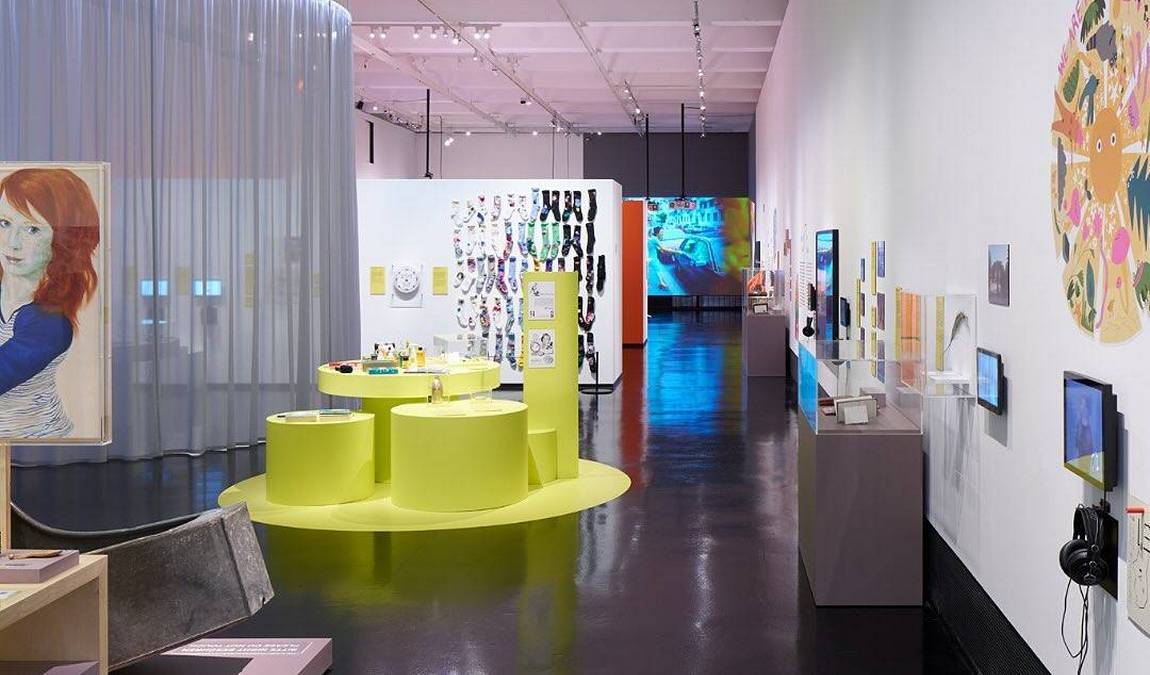 Photo: facebook.com/dhmdresden
Photo: facebook.com/dhmdresden
When planning a visit to the Deutsches Hygiene Museum in Dresden, critical details regarding facilities, programs, and activities ensure a smooth and enriching experience for the whole family.
Facilities and Accessibility
All exhibition areas are wheelchair accessible, ensuring a comfortable visit for everyone.
Educational Programs
The Deutsches Hygiene Museum is not simply a space for historical reflection; it's a vibrant educational hub. The museum is dedicated to inspiring the next generation with various programs tailored for children and young minds.
- For children: Engaging hands-on experiences and workshops are designed to spark curiosity in young visitors.
Tours and Activities
To enrich the experience, visitors should not miss the guided tours. Known as Führungen in German, these tours offer an in-depth look at the exhibitions and are available on various topics.
- Guided Tours: Offered on specific days, check the museum's official schedule for the most current information.
Remember to soak in the fascinating array of tours and activities that cater to the entire family, making each visit memorable and educational.
Best Time to Visit
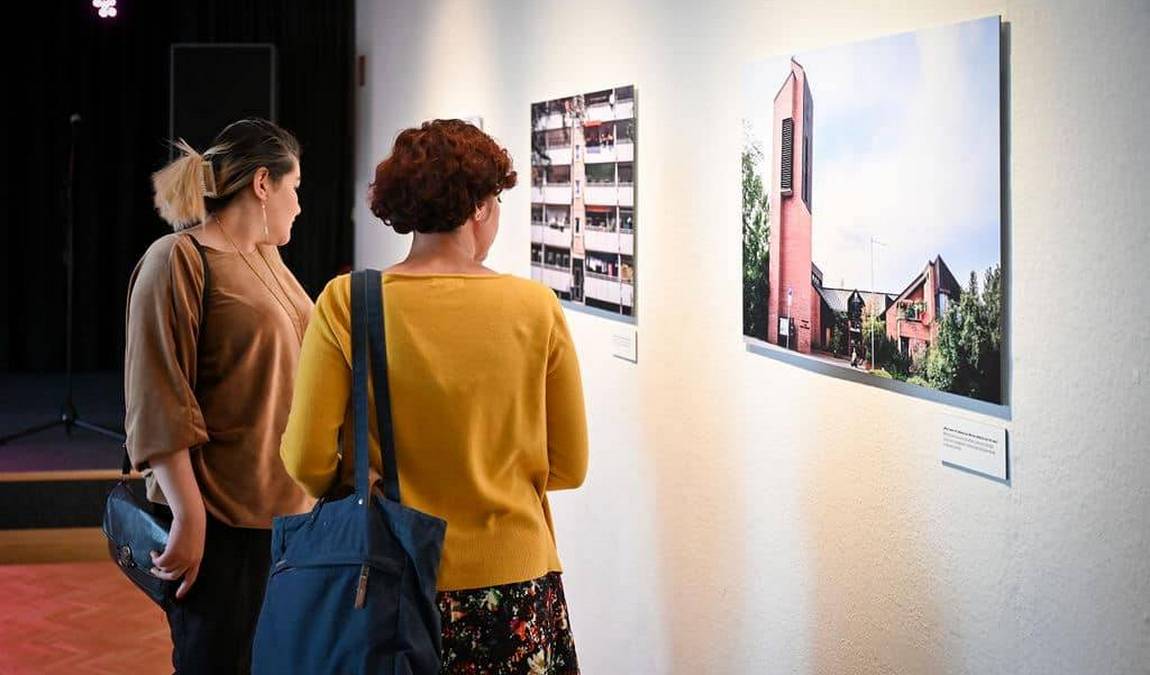 Photo: facebook.com/dhmdresden
Photo: facebook.com/dhmdresden
It is a compelling destination for families seeking an educational experience that delves into the wonders of the human body. When planning a visit with children, timing is critical to ensure an interactive and engaging visit.
Weekends are prime times for family outings, and fortunately, the museum is open on Saturdays and Sundays from 10:00 am to 6:00 pm. These hours provide ample flexibility to explore the exhibits without the rush of weekday schedules. Consider arriving early for a more tranquil experience as the museum doors open.
During weekdays, particularly Tuesday through Friday, the crowds are typically smaller, which might be preferable for families with young children who would benefit from a quieter environment. Visiting right at opening time or in the early afternoon, post-lunch, when there is usually a lull, can make for an optimal experience.
Particular attention should be given to the museum's interactive areas, such as the Children's Museum, where younger visitors can engage in hands-on learning. This museum section uniquely caters to children's curiosities, making it an ideal spot to spend time.
For the best experience, reviewing the museum's current events and exhibitions beforehand is advisable. This ensures that families can attend child-friendly activities, which are often available.
Remember to consider closing days and public holidays when planning your visit. Overall, this spot offers families an informative and memorable outing, with ample opportunities to learn and explore together.
How Long Does It Take to Attend?
Visiting this museum is a delightful and educational experience, fitting for families looking to sprinkle a bit of learning into their trip. The museum's exhibits are thoughtfully curated to appeal to a wide range of ages, making it an excellent stop for parents and children.
Families should allocate 2 to 3 hours to fully explore the museum's offerings. This would give them ample time to engage with the interactive elements and absorb the fascinating insights about the human body and health without feeling rushed.
Suggested Itinerary:
- 10:00 am: Arrive shortly after opening to avoid larger crowds.
- 10:15 am – 12:15 pm: Engage with permanent exhibits, enjoying the hands-on aspects tailored to curious minds.
- 12:15 pm—12:45 pm: Take a leisurely break at the museum café, where you can discuss the exhibits over light refreshments.
- 12:45 pm – 1:30 pm: Explore the temporary exhibitions, which often tackle contemporary science and societal topics.
Museum Tip: The last admission to the museum is at 5:30 pm, but aim to start your visit earlier in the day. It helps ensure a calm and composed tour, especially with younger visitors, and provides a buffer should the family discover a particular exhibit they are drawn to.
Remember, while the above is a recommended schedule, each family's pace can vary, and some may find themselves lingering longer amidst the museum's intriguing exhibits.
Is the German Hygiene Museum Worth Visiting?
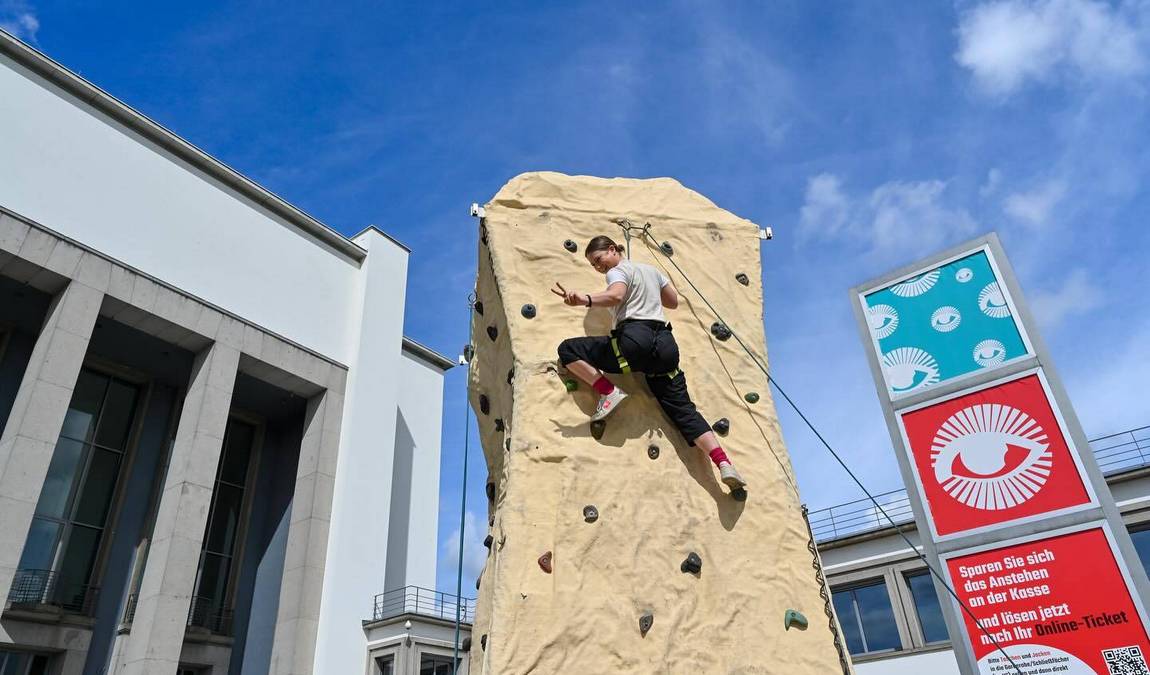 Photo: dhmd.de
Photo: dhmd.de
The German Hygiene-Museum beckons as an inviting option when planning a family outing with an educational twist in Dresden. Renowned for its interactive and informative exhibits, the museum offers a fascinating journey through human biology and health.
The permanent exhibition, "The Human Adventure," allows visitors to see the Transparent Man and other anatomical models that have enthralled audiences for decades. The museum's ability to blend scientific knowledge with engaging displays makes it a unique cultural attraction.
Children are especially captivated in the Children's Museum section, where the tactile and interactive approach to learning complements the curiosity of younger minds. The exhibits, perfectly tailored for children, focus on the senses and the human body, encouraging them to explore in a way that textbooks cannot match.
For families, there's the added benefit that kids can have an enjoyable learning experience, making it a significant element of an enriching family vacation in Dresden. The museum's location, a stone's throw from the iconic Frauenkirche and amidst the baroque splendor of Großer Garten, adds to its appeal, making it not just a visit to a museum but a comprehensive cultural experience.
In conclusion:
German Hygiene Museum is worth visiting for its engaging exhibits, the chance for kids to learn through play, and because it provides a rich cultural context within Dresden. Families with children will appreciate the blend of education and entertainment that caters to the curious minds of all ages. Delight in the museum's capacity to spark conversations about the wonders of the human body and health, making for a memorable outing sure to inspire. Plan a visit and discover the essence of human biology in an enjoyable and enlightening environment.


